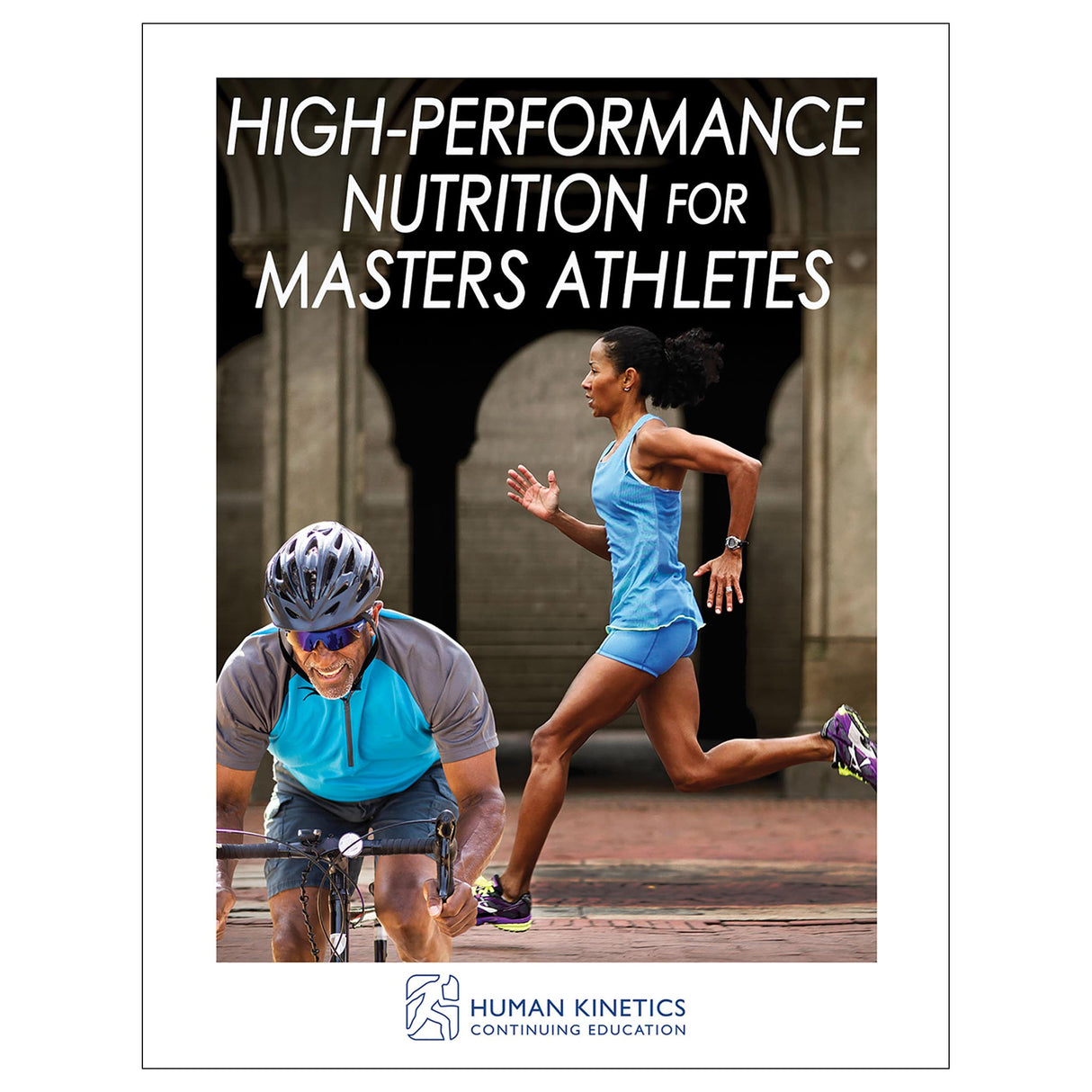High-Performance Nutrition for Masters Athletes Online CE Exam With Print Book
Author: Human Kinetics
$75.00 CAD
Human Kinetics strongly recommends that you complete your exam within the calendar year of your date of purchase to ensure approved credits do not expire for your organization.
- High-Performance Nutrition for Masters Athletes book
- Online continuing education exam
You’ll be taken inside the fueling strategies for precompetition, competition, and recovery:
- Gain an understanding of the need for different types or amounts of nutrients at different times and get easy-to-follow guidance on how to meet those needs.
- Learn how to energize with carbohydrate, build muscle with protein, and meet hydration needs for optimal athletic performance.
- Know the role vitamins, minerals, and supplements can play in a nutrition plan and how devastating underfueling can be to athletic performance.
- Understand how chronic conditions such as high blood pressure, diabetes, and cardiovascular disease affect nutritional needs.
- Use the sample meal plans to help athletes customize meals and snacks and reset eating habits to meet their needs in training and competition.
After reading the book, certified professionals can take the companion CE exam to earn continuing education credits.
Learning Objectives
- Describe the changing nutritional needs of Masters athletes as they age.
- Define sarcopenia.
- Understand the role of hormones in appetite and overall nutrition.
- Describe how nutrition can help aging adults to reduce the risks of developing diabetes, hypertension, and cancer.
- Interpret research findings that are relevant for Masters athletes’ nutritional choices.
- Summarize the appropriate carbohydrate, protein, fat, and fluid intake levels for Masters athletes before, during, and after exercise or competition.
- Discuss the possible benefits and appropriateness of supplement use for certain populations.
- Recognize the signs of disordered eating and eating disorders as well as the side effects of underfueling.
- Describe appropriate precompetition, competition-day, and recovery fueling requirements and timing for Masters athletes.
Audience
Certified professionals working with aging athletes, including sport nutritionists, personal trainers, and athletic trainers.Chapter 1. Defining the Masters Athlete
Age is only a number. Masters athletes continue to compete and participate in sport in growing numbers. Masters athletes may be grouped according to age, but that doesn’t mean they have to slow down.
Chapter 2. Demystifying Age-Related Changes
Aging may bring wisdom, but it can also bring physiological changes that affect strength, maximal oxygen uptake, metabolism, bone health, sleep, and more.
Chapter 3. Nutritional Strategies to Manage and Prevent Disease
No diet can make you immortal, but research suggests that smart nutritional changes can help you manage and possibly prevent diabetes, cardiovascular disease and hypertension, and cancer.
Part II. Smart Fueling
Chapter 4. Nutrition Principles for Masters Athletes
We all know how to eat, right? But how are we to know how our food choices affect long-term overall health and sport performance in our ever-changing food landscape?
Chapter 5. Energizing Carbohydrate
Carbohydrate is key for energy during training or competition and for recovery. Learn to match your carbohydrate intake to your sport and goals, choose carbohydrates that fit your needs, and optimize intake for peak performance.
Chapter 6. Muscle-Building Protein
Activity and adequate protein intake keep muscles strong for healthy aging and impressive performance. Learn to time protein intake for maximum effect before, during, and after a training session or competition.
Chapter 7. Healthy Fat
Don’t be afraid. Dietary fat is a key part of a healthy diet for Masters athletes. Learn to incorporate it into your meals and snacks for optimum health.
Chapter 8. Supplements
Which supplements have scientific backing and which are a waste of money? Look past the hype to discover which supplements might be worth trying and which ones to leave behind.
Chapter 9. Fluid Needs
Eight glasses of water a day, right? Well, maybe not. Many factors influence fluid needs, including environment and activity level. Wade through the science to learn what to consume and when to consume it to keep tissues hydrated and thirst at bay.
Chapter 10. Underfueling
Tough competition and hard training can lead Masters athletes to unhealthy eating behaviors that jeopardize their health and sport goals. Early recognition and intervention are key to successful recovery from disordered eating and eating disorders.
Part III. Nutrient Timing
Chapter 11. Precompetition Fueling
Is carbohydrate loading necessary? How much fluids and protein should you take in? Learn to prepare your body for competition by feeding it what it really needs.
Chapter 12. Competition-Day Fueling
Proper fueling on the day of competition leads to better performances and happier, healthier Masters athletes at the finish line.
Chapter 13. Recovery Nutrition
After the competition, you need to feed and rehydrate your cells for proper recovery. After all, there’s always the next training session or competition to look forward to.





